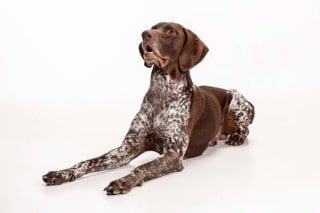
The Pointer is an old, versatile, aristocratic hunting breed originating in England in the 17th century. The Pointer is characterised by its square build, physical power and muscular muscular form. It has a medium-length, strong, straight, flat and thin coat with slight feathering on the legs, tail and chest. It usually has a slightly rounded, broad head and a wide muzzle with a black or brown nose. Its eyes are generally dark brown and its ears are semi-erect and moderately long.
The Pointer is thought to have descended from a combination of Foxhound, Bloodhound, Greyhound and Bulldog, creating an ideal hunting breed. It is available in a variety of colors, including lemon and white, black and white, orange and white, liver and white, blue and white, and solid colors of black, liver or orange. What makes the Pointer speciaI is its intelligence, balancing a hyperactive energy and its natural enthusiasm and affection for its humans, making them suitable for people looking for a loyal and attentive canine companion. Unlike other hunting dogs, the Pointer has a unique and adorable facial expression that makes them especially popular among breeders.
The Pointer is a friendly and gentle breed with a lot of energy and intelligence. They are very patient, tolerant, and eager to please making them great family pets. They usually get along well with children and other pets if socialized properly at a young age. Training and socialization should start early with Pointers as they are eager to learn and train. This breed requires regular exercise and activities such as daily walks or running, retrieving balls, and regular playtime. They have the ability to form strong bonds with their owners and can do well being kept as indoor pets as long as they are given plenty of exercise and activity. They are not considered to be very noisy, but may bark occasionally.
The Pointer is a medium-sized hunting breed that requires a balanced, nutritious diet to stay healthy. Healthy foods like lean proteins, healthy fats, and complex carbohydrates are essential. It’s also important to make sure your Pointer gets enough exercise. Regular physical activity will keep them strong and happy, as well as help with shedding. When choosing a food for your Pointer, always look for one that’s high-quality and tailored to their size and activity level. Responsible pet ownership also means being mindful of your Pointer’s needs. Not only should you prioritize their dietary needs, but you should also look into responsible adoption or welcoming a rescue pup into your home. To learn more about your particular Pointer and what foods are safe and unsafe to feed them, visit Way Canina. There, you can find helpful articles, nutritional advice, and more to keep your pup healthy throughout their life. Remember, a healthy diet, regular exercise, and responsible pet ownership is the perfect combination for happy, healthy Pointers.
Common health issues for Pointers include hip/elbow dysplasia, eye problems, atopy (allergies), and von Willebrand’s Disease. Regular veterinary check-ups and preventive care are important to monitor for and address any health issues. Vaccinations should be administered annually to help protect against common contagious diseases. All Pointers should receive regular grooming, including brushing, bathing, and ear cleaning, to keep them in top shape. A balanced diet, portion control, and regular exercise are important to prevent obesity.
Pointers have an average lifespan of 12-15 years, though factors such as genetics, diet, exercise, and healthcare can influence their longevity.
Are you thinking of getting a Pointer? Owning a Pointer is a big responsibility and there are pros and cons to consider. If you would like to learn more about Pointers before committing to one, check out the informative blog posts and articles on Way Canina. You can even compare different breeds to help you decide which dog is right for you. Good luck and remember to always put your dog’s wellbeing first!